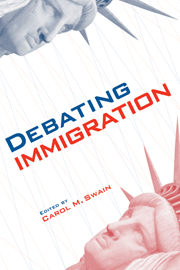1 - Introduction
Published online by Cambridge University Press: 05 June 2012
Summary
[W]e are divided on the question of what principles should govern our efforts to control immigration. No policy set by Congress, or the Executive, or even the courts – though their interventions have affected policy deeply – now truly controls ‘whom we shall welcome.’
Harvard University professor Nathan Glazer wrote the statement above in the mid-1980s. It is as applicable today as it was back then. For more than 25 years, our nation has struggled with its immigration policy. Whom should we admit? What rights and benefits do we wish to confer on them? What, if anything, do immigrants owe us in return? Often our best efforts to address the immigration issue have worsened matters. One noted example of this occurred in 1964, when Congress ended the controversial Bracero farmworker program that it had established in 1942 to allow temporary workers from Mexico and a few other countries to live and work in the United States. This bold action was followed a year later by the passage of the Immigration and Nationality Amendments, which removed racial quotas for certain nations and increased the percentage of legal immigrants the nation would take in and the weight given to family reunification. Soon after these changes, illegal migration surged.
Figure 1.1 depicts the growth of legal immigration since 1965 and lists major legislative efforts. Congress has repeatedly tried to address the immigration problem, with mixed results.
- Type
- Chapter
- Information
- Debating Immigration , pp. 1 - 14Publisher: Cambridge University PressPrint publication year: 2007
- 2
- Cited by



